Home >Web Front-end >JS Tutorial >Detailed explanation on the use of slot socket of vue component
Detailed explanation on the use of slot socket of vue component
- php中世界最好的语言Original
- 2018-04-20 13:37:321556browse
This time I will bring you a detailed explanation of the use of the slot socket of the vue component. What are the precautions when using the slot socket of the vue component. The following is a practical case, let's take a look.
Child component
<template>
<p class="slotcontent">
<ul>
<!--<slot></slot>-->
<li v-for="item in items">{{item.text}}</li>
</ul>
</p>
</template>
<script>
export default{
data(){
return{
items:[
{id:1,text:'第1段'},
{id:2,text:'第2段'},
{id:3,text:'第3段'},
]
}
}
}
</script>
<style scoped>
</style>
Parent component
<template>
<p>
<h2>首页</h2>
<router-link to="/home/details">跳转到详情</router-link>
<p>父组件</p>
<slotshow>
<p>{{msg}}</p>
</slotshow>
</p>
</template>
<script>
import slotshow from '../components/slotshow'
export default{
data(){
return{
msg:"测试内容"
}
},
components:{
slotshow
}
}
</script>
<style>
</style>
This situation is if you want a parent component To insert content into a subcomponent, the slot tag must be declared in the subcomponent. If the subcomponent template does not contain the <p>{{msg}}</p> will be discarded.
When slot has a default value default value<slotshow></slotshow>## When there is no content to be inserted in #, <p>default value</p> will be displayed (the p tag will be removed). When the slot has a default value and the parent element has content to be inserted in <child> , the value set in the parent component is displayed. The
named slot##
name to configure how to distribute content. Multiple slots can have different names. The named slot will match elements with the corresponding slot attribute in the content fragmentvar childNode = {
template: `
<p class="child">
<p>子组件</p>
<slot name="my-header">头部默认值</slot>
<slot name="my-body">主体默认值</slot>
<slot name="my-footer">尾部默认值</slot>
</p>
`,
};
var parentNode = {
template: `
<p class="parent">
<p>父组件</p>
<child>
<p slot="my-header">我是头部</p>
<p slot="my-footer">我是尾部</p>
</child>
</p>
`,
components: {
'child': childNode
},
};
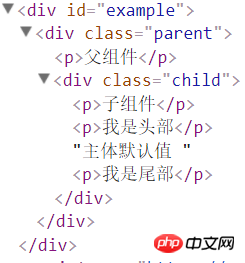 You can still have an anonymous slot, which is the default slot, as if no matching content fragment is found Spare slot. Anonymous slots can only be used as slots for elements without slot attributes. Elements with slot attributes will be discarded if no slot is configured.
You can still have an anonymous slot, which is the default slot, as if no matching content fragment is found Spare slot. Anonymous slots can only be used as slots for elements without slot attributes. Elements with slot attributes will be discarded if no slot is configured.
var childNode = {
template: `
<p class="child">
<p>子组件</p>
<slot name="my-body">主体默认值</slot>
<slot></slot>
</p>
`,
};
var parentNode = {
template: `
<p class="parent">
<p>父组件</p>
<child>
<p slot="my-body">我是主体</p>
<p>我是其他内容</p>
<p slot="my-footer">我是尾部</p>
</child>
</p>
`,
components: {
'child': childNode
},
};
<p slot="my-body">插入<slot name="my-body">中,<p>我是其他内容</p>插入<slot>中,而<p slot="my-footer">被丢弃
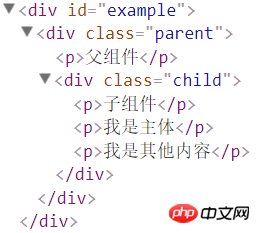 If there is no default slot, These content fragments that cannot find a match will also be discarded
If there is no default slot, These content fragments that cannot find a match will also be discarded
var childNode = {
template: `
<p class="child">
<p>子组件</p>
<slot name="my-body">主体默认值</slot>
</p>
`,
};
var parentNode = {
template: `
<p class="parent">
<p>父组件</p>
<child>
<p slot="my-body">我是主体</p>
<p>我是其他内容</p>
<p slot="my-footer">我是尾部</p>
</child>
</p>
`,
components: {
'child': childNode
},
};
<p>我是其他内容</p>和<p slot="my-footer">都被抛弃
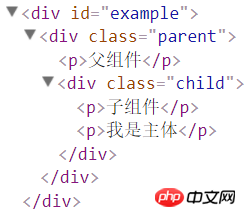
Scope slot A scoped slot is a special type of slot used to replace a rendered element with a reusable template that can pass data to it.
In the child component, just pass the data to the slot, just like passing props to the component
<span style="font-size: 16px"><p class="child"> <slot text="hello from child"></slot> </p></span>
In the parent, the element with the special attribute scope Must be present to indicate that it is a template for a scoped slot. The value of scope corresponds to a temporary
variable name. This variable receives the props object passed from the child component.var <span style="color: #ffffff">childNode</span> = {
template: `
<p class="child">
<p>子组件</p>
<slot xxx="hello from child"></slot>
</p>
`,
};
var parentNode = {
template: `
<p class="parent">
<p>父组件</p>
<child>
<template scope="props">
<p>hello from parent</p>
<p>{{ props.xxx }}</p>
</template>
</child>
</p>
`,
components: {
'child': childNode
},
};If the above result is rendered, the output obtained is
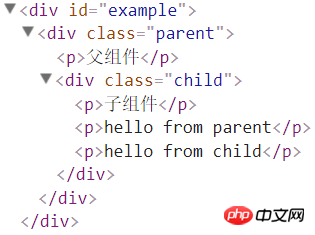
[List GroupComponent]A more representative use case for scope slots is the list component , allowing components to customize how each item in the list should be rendered
var childNode = {
template: `
<ul>
<slot name="item" v-for="item in items" :text="item.text">默认值</slot>
</ul>
`,
data(){
return{
items:[
{id:1,text:'第1段'},
{id:2,text:'第2段'},
{id:3,text:'第3段'},
]
}
}
};
var parentNode = {
template: `
<p class="parent">
<p>父组件</p>
<child>
<template slot="item" scope="props">
<li>{{ props.text }}</li>
</template>
</child>
</p>
`,
components: {
'child': childNode
},
};
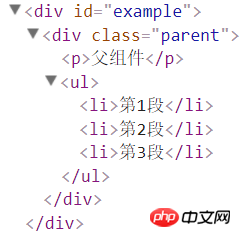 I believe you have mastered the method after reading the case in this article. For more exciting content, please pay attention to other related articles on the PHP Chinese website !
I believe you have mastered the method after reading the case in this article. For more exciting content, please pay attention to other related articles on the PHP Chinese website !
Recommended reading:
vue-router lazy loading detailed explanation (with code) How to reference the verification code in the Vue projectThe above is the detailed content of Detailed explanation on the use of slot socket of vue component. For more information, please follow other related articles on the PHP Chinese website!
Related articles
See more- An in-depth analysis of the Bootstrap list group component
- Detailed explanation of JavaScript function currying
- Complete example of JS password generation and strength detection (with demo source code download)
- Angularjs integrates WeChat UI (weui)
- How to quickly switch between Traditional Chinese and Simplified Chinese with JavaScript and the trick for websites to support switching between Simplified and Traditional Chinese_javascript skills

